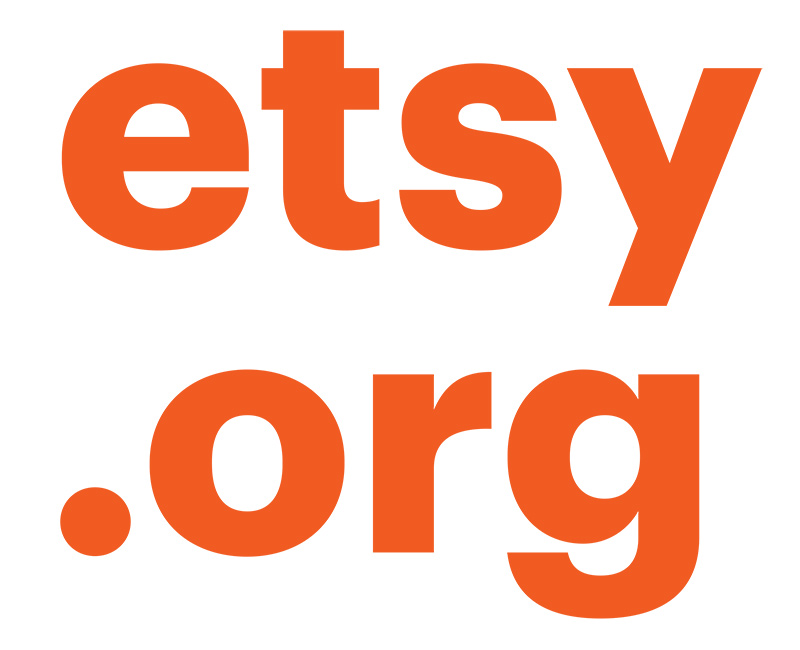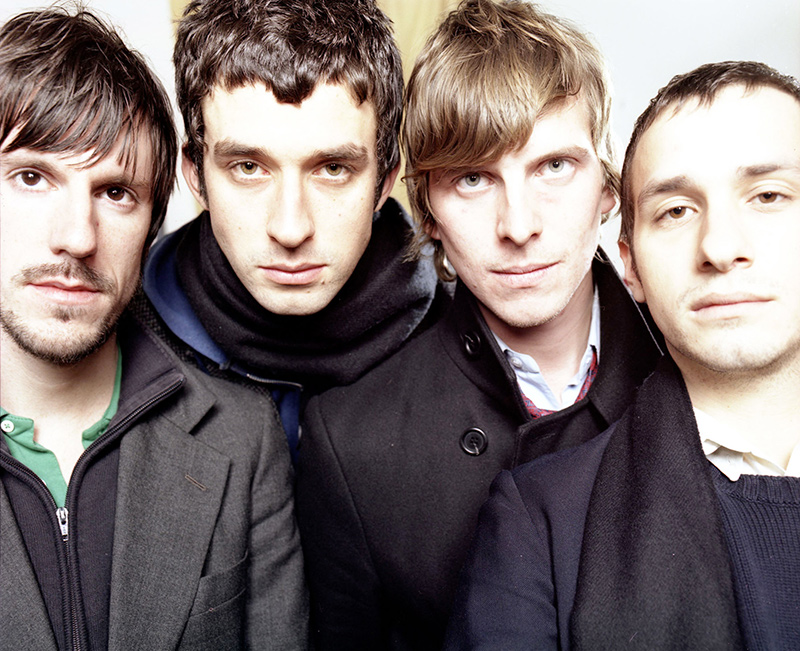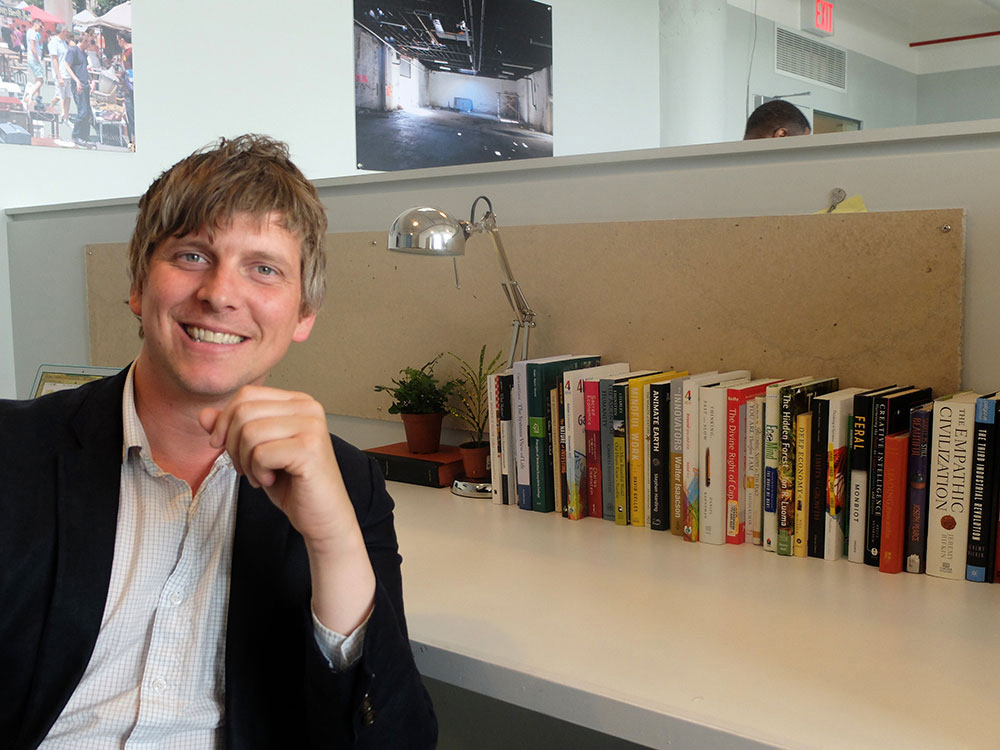
Matt Stinchcomb, a founder of Etsy, inspires us with his mission of shaping future enlightened businesses
—
Matt Stinchcomb sounds and looks like the kind of guy who is more likely to be playing in an indie rock band than running a foundation whose goal is to revolutionize the whole concept of business education as we know it. That may be, in part, because he was in a post-punk garage band before he left to cofound the online company Etsy, which enables people to sell their handmade crafts and goods to buyers worldwide. Starting almost exactly a decade ago, Etsy now has over a million sellers and its recent IPO raised 267 million dollars — three million of which they have invested in the foundation that Stinchcomb now heads, called Etsy.org. According to its surprisingly barebones website, the foundation aims to teach the art of business to up-and-coming entrepreneurs and, in the process, help “to reimagine commerce in ways that build a more fulfilling and lasting world.”
From lead guitarist to marketing director of a small online startup to head of a foundation sounds like an incongruous learning curve, but it turns out to be organically connected — in a rock and roll kind of way. “It’s so funny where life takes you,” Stinchcomb says by phone from his office in the Crown Heights section of Brooklyn, just six blocks from where he lives with his wife and two young children.
“If somebody had told me years ago that my job would now be trying to build a business school, I would’ve thought they were insane. And I would’ve wanted to beat myself up. Business school? What a loser!”
He laughs easily, as if the path he’s followed makes some kind of sense after all. Before he helped found Etsy, Stinchcomb played guitar and sang in French Kicks, an indie rock band formed with friends from the Washington, D.C., area where he grew up influenced by the local hardcore music scene. (Now, having just turned 40, he says, he admires mainly the “old white guys — Leonard Cohen, Bob Dylan, Neil Young, and Tom Waits.”)

After earning a degree in art history from Oberlin College, he moved to Brooklyn with two of his bandmates, but with little money and a ton of student loan debt. On his first night in New York he went to a bar, where he ran into a woman he knew from high school. “Her boyfriend worked on something called a website,” Stinchcomb says. “I knew only roughly what that meant.”
In the early years of the first dot-com boom, the do-it-yourself ethic and entrepreneurial spirit allowed Stinchcomb to work on the Internet by day while touring and recording with French Kicks (“it was the least bad name we could think of”) until the band became successful enough to let him quit his day job. In his spare time he learned how to screen-print T-shirts and posters for the band by reading online tutorials; other musicians liked his work and suddenly, with no formal training, he had a business. In the spirit of most startups, he learned on the fly what amounted to “a whole set of business skills, including a lot about the toxic chemicals that are used — and I tried to find alternatives.”
As the dot-com world was taking shape in Silicon Valley, what came to be known as the “maker” movement was underway in Brooklyn, where Stinchcomb met Rob Kalin, whose college major in the classics seemed to be as unrelated to a business career as Matt’s degree in art history. But one thing they shared was a love of making things by hand. In a talk at the Schumacher Center for a New Economics last year, Stinchcomb said of Kalin that “he could take beautiful photographs, he could do woodworking, he could do all sorts of things, and that’s how Etsy came about.”
“It was unlike your typical company,” Matt says now. “We would play guitar a lot, because Rob was learning to play and he wanted me to show him certain things.” Once Etsy got up and running, Matt was put in charge of marketing — which seemed like an odd choice until he saw what it required. “Really what I did was go on tour again, travel from town to town and meet with groups of Etsy sellers. I never stopped being on tour. I just started staying in hotel rooms instead of crashing on people’s floors.”
Given the open-ended statement on the Etsy.org site, I ask Matt how he would describe the foundation’s stated mission. “To truly reimagine commerce is going to require a shift in consciousness,” he says. “We have to fundamentally reimagine our whole belief systems and value systems, and come up with new definitions of what success is, of what a return is. And not just in terms of financial forms of capital, but also natural capital, spiritual capital. We know that if we’re just optimizing for maximum capital return, that’s not sustainable. Our world will collapse if we continue to do that. It will take the end of capitalism on some level to build the world that we want to build.”
Not exactly what Wall Street wants to hear, maybe, but Stinchcomb is in it for the long haul. “That’s a lofty ambition and aspiration that’s not going to happen overnight,” he acknowledges. “The science would suggest that it’s going to change one way or another. I’m not naïve [enough] to think that it’s going to be easy to do. But I do see more and more examples of people who are reimagining commerce and business, and viewing success in different ways. And that’s where Etsy.org comes in.
We want to find those entrepreneurs who want to reimagine the purpose of business and what success looks like — and invest in them in the form of education and community, and connect them to financial capital people.
How can we do everything we can to help them be successful?”
One way is what he likes to call “weird business.”
“I don’t want business as usual. Part of reimagining commerce is reimagining business education, taking it away from the abstract to the experiential by having them start a real business. How do we help people develop businesses that don’t perpetuate so much of what’s awful about these systems? There’s the Buckminster Fuller idea that you don’t create change by fighting the existing reality; you build new systems that render the old ones obsolete. That’s how I was thinking, but a friend of mine provided a more nuanced idea that I think is much better.”
His friend suggested that he consider the Tappan Zee Bridge, which spans one of the two widest stretches of the Hudson River and is nearly five miles long. The current bridge, completed in 1955, was intended to carry less than one-third its present load, and to last only 50 years. The new bridge is planned to last at least 100 years — but the construction plan, already underway, calls for the new bridge to be built alongside the old one. “On some level that’s the new economy,” Matt says. “That’s the new system that we have to build. In the meantime, the cars are still going over the old one. But once they transition to the new bridge, the old one’s going to become bike lanes and walking paths. We have to improve the old with the new.” [http://www.newnybridge.com/about/ ]
That will take time, which may be in short supply. Stinchcomb cites one of his favorite thinkers, Jeremy Rikin, who wrote in The Third Industrial Revolution that every time there’s a big shift in the culture there’s also usually a communications revolution. “And the Internet provides that now,” Matt says. “On one level I feel like a real Luddite and I’m always trying to be less connected, always trying to get rid of technology in my life. But on another level, it’s technology that will allow us to spread ideas and organize quickly enough to address pressing crises like climate change — where we don’t have 200 years for the evolution of thought to come around. We’ve got, like, 10 years, five years — maybe minus 20 years!”
The current business model in the U.S., from venture capital to business schools, is geared toward fast growth and getting as big as possible. Stinchcomb wants the new foundation to move in the other direction.
“This is a tool that we want to give to small business owners to manage their businesses everywhere,” he says. “That is the new paradigm — lateral distributed networks rather than big concentrations of power. We don’t want to create a small number of very big businesses that are going to have a ton of influence on the world. We want to create a very big number of small local businesses that are going to take the time have a relationship — a handmade relationship — with their communities. To know the people, to know the place, to go deep on the place.
“We’re calling our business incubators regenerators. The idea is to bring a cohort of around 15 people together to go through the program where they’re based, and build businesses that will regenerate those specific local economies.” Going town to town and region to region, the plan is to develop a viable model for building these regenerators, then create online courses built around video.
“We want to go where any group can form their own DIY business school in which every student becomes a teacher. In the traditional world, teachers have to have a Ph.D. in business, but we have to make it more about people who are doing it or have done it, rather than people who have only written about it or studied it. I don’t mean to say that there’s something wrong with that, but we want to develop more direct ways of learning based on real experiences.”
Challenging the standard model of Harvard Business School, the foundation would rely on teachers with little or no academic credentials but plenty of hard-earned street cred. “A lot of the business education I got,” Stinchcomb says, “came from screwing up a bunch of times, or figuring things out as I go, or trusting my intuition. All of those things kind of pieced together are a great business education.”
As I dig a little deeper into Matt’s creative process, he reveals a spiritual underpinning to the whole endeavor.
“I’m interested in contemplative practice, and in particular Zen Buddhism, which has probably been the best teacher that I’ve had for business,” he says. “Not being so attached to things. Cultivating a beginner’s mind, the ability to listen deeply to others, empathy — these are all things that are incredible skills for business, but they’re not the stuff that’s taught in business school.”
Although he wasn’t raised with any sort of spiritual practice, Stinchcomb started getting interested in Zen in 2009, first by reading books, including Shunryu Suzuki’s classic Zen Mind, Beginner’s Mind. He now follows a regular meditation practice but, he says, “It’s more than just a mindfulness piece. I think that the teachings of the Buddha himself are so spot-on, that needs to be a part of it too, and I just want to study that more. I want to find my sangha —a regular community that I can be a part of.”

And he connects all that with his views about business. “I would say that the spiritual practice coincided with the time I was learning about economics, and they’re completely intertwined at this point. The school is about the wedding of personal development, systems thinking, and business skills.” The list of guest lecturers and teachers for the pilot program includes iconic activists and innovators such as Bernie Glassman, the aerospace engineer-turned-Zen Monk who now leads Bearing Witness Retreats worldwide; Judy Wicks, of White Dog Café fame, who put the concept of “local living economies” on the map; Alex Wright, a leading user interface researcher for Etsy, Harvard and Adobe; among a growing list of others.
As for the Etsy.org program, however, he doesn’t want to be prescriptive and say that anyone needs to be a Zen Buddhist or anything else.
“What we think is important is contemplative practice or leading an examined life, taking the time for reflection in order to develop the capacity to expand your compassionate consciousness to include your community.”
One day while watching the Space Show in the Hayden Planetarium at the American Museum of Natural History, he heard the Planetarium’s director, Neil deGrasse Tyson, “talking about how everything is made up of the same stuff as stars,” and the pieces began to fall into place. Citing other books he had read, including Rifkin’s The Empathic Civilization and Fritjof Capra’s The Systems View of Life, Matt sums up his vision this way: “It’s that we are all one. As Rifkin says in his book, we’re wired for empathy. If you’re just optimizing for yourself at the expense of others, you’re actually hurting yourself. And that’s when a shift of consciousness comes into play, especially when it comes to business.”
Again, though, Stinchcomb is concerned that the shift isn’t happening fast enough. “The public school system is still set up from the industrial age, from a time when they were preparing people to be on an assembly line,” he says. “That’s part of what we’re trying to counter right now.”
At the same time, he knows that things have moved pretty fast in his own life. “It felt like such a big change to go from being in a band in my 20s and touring around and having a lot of fun, to having a desk job and building a company in my 30s. Now at 40 I’m leaving that again to do another startup, which is a huge challenge. And it’s the first time I’m in charge. Now here’s my chance to execute my vision for the world — and let’s see if I can do it! I have no idea what I’m doing and that’s wonderful, because I have a real beginner’s mind. That’s really exciting.”
[Editor’s note: Etsy has since renamed Etsy.org to The Good Work Institute to better reflect their mission]
You may also enjoy Jazz & Spirituality | The Mindful Music of Jack DeJohnette by Peter Occhiogrosso